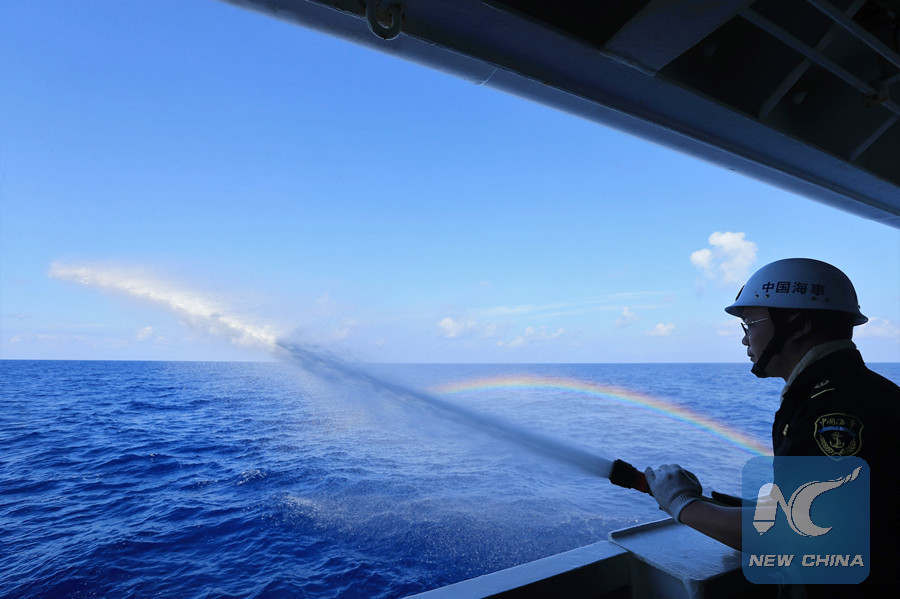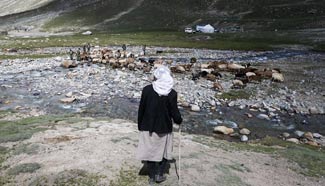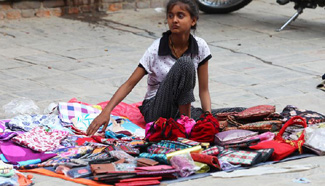
A crew member takes part in a fire drill on China's largest and most advanced patrol vessel Haixun 01 on the South China Sea, April 4, 2016. (Xinhua/Xing Guangli)
MANILA, June 13 (Xinhua) -- Philippine experts on Monday urged incoming president Rodrigo Duterte to proceed with direct talks with China on the South China Sea immediately, saying the new administration need not wait for the decision of a tribunal to kick-start the talks.
Rod Kapunan, a columnist for the newspaper The Standard, said it may not be wise for the incoming Duterte administration to wait for a decision from an tribunal in The Hague which China will not recognize anyway.
"Once the court comes out with a decision, our position to reach a direct and peaceful settlement of our dispute with China would become more difficult," Kapunan told Xinhua in an interview.
"China has always been open for direct and peaceful negotiations but the conditions will not be the same after the decision," he said, warning that the decision might even force Beijing to stay away from the negotiating table.
"If you are going to negotiate directly and peacefully with China after the arbitration decision comes out, China will surely insist that there must be no reference to the court's decision," Kapunan said.
In 2013, the Philippines initiated an arbitration case against China over the South China Sea. China, which has declined to take part in the process, has said it will not recognize the court's decision.
For the direct talks to take off, Kapunan said the Duterte administration must scrap its Enhanced Defense Cooperation Agreement (EDCA) signed by the Philippines and the United States in 2014.
The expert also said that this pact "locks the Philippines in a situation where we would be permanently girding for war with China" and adopt a foreign policy that unmistakably serves the interest of the U.S. in the Asia and the Pacific.
"The best solution is first to scrap the EDCA and second to start the direct talks," said Kapunan, adding that EDCA stands in the way "like a wall" between the Philippines and China.
"For as long as we have foreign military bases in our soil, the country can never formulate its own independent foreign policy," Kapunan said.
"As a lawyer, Duterte could see the implication in allowing the re-installation of the U.S. bases. Other than providing no time limit for the American's stay, the agreement gave the U.S. the blanket authority to select the place and the number with a premium that our Senate would have to ratify it as mandated by our Constitution," Kapunan added.
Indeed, Kapunan said, "The abrogation of EDCA is the easiest way (for the Duterte administration) to escape the dilemma."
He said, "President Benigno Aquino III knew that by bringing our dispute with China to the PCA (the Permanent Court of Arbitration in The Hague) would give the U.S. the leverage to continue its provocative patrol in the South China Sea."
By doing that, "the perception about the naval presence of the U.S. in the South China Sea can never be doubted because the Philippines being strategically adjacent to China would forever seek the protective cover of the U.S.. In short, all these could lead the country to a possible proxy war with China," Kapunan said.
This explains why, Kapunan said, Duterte would have difficulty redrawing the foreign policy under his administration.
He further said, "A decision to disallow the U.S. bases or to unilaterally drop the case could antagonize the U.S. because that would explode its continued presence in the South China Sea redundant. Nobody would believe that its continued patrol in the area is to secure the freedom of navigation. Rather, the whole military infrastructure it build would be exposed as a facade to contain China."
Indeed, retired diplomat Alberto Encomienda told Xinhua in another interview that the new Duterte administration should proceed with talks with China on the sea disputes.
"You don't have to wait for the resolution of the arbitration case before starting conversations. You don't have to finish that arbitration. Nobody even knows when that will be finished," Encomienda said.
Assistant Foreign Secretary Charles Jose has repeatedly said that the Philippines will really have to go back to bilateral talks, though he pins hope on the arbitration court handing down a favorable decision.
In a television interview Monday, Jose said, "we are now in the tail-end of the arbitration process."
Duterte, who will be sworn into office on June 30, has said he would wait for the final decision of the court, but at the same time said that he will pursue bilateral talks with China if current efforts do not progress. He even said that he might explore possible joint exploration in the disputed South China Sea.
Duterte also said that the Philippines is not going to give up its rights to the Scarborough Shoal, or Huangyan Island.
But before 1997, the Philippines had never claimed sovereignty over Huangyan Island, and the international community had never raised any objection to China's sovereignty over the island as well.
Related:
Spotlight: Experts say China's stance on South China Sea arbitration fully justified
BEIJING, June 10 (Xinhua) -- The Philippines' unilateral move to bring a maritime dispute with China to an international tribunal won't help resolve the problem and the right way forward is to seek settlement through bilateral talks, several foreign experts told Xinhua in recent interviews. Full story
Interview: Manila intensifies tension in South China Sea -- former diplomat
MANILA, June 9 (Xinhua) -- The Philippine government has been behind the intensifying tensions in the South China Sea, a former diplomat of the country told Xinhua on Wednesday.
Alberto Encomienda, former secretary-general of Maritime and Ocean Affairs Center of the Philippine Foreign Affairs Department, said: "China has been for the negotiations all along, but from the beginning we are not." Full story
How to Bridge the Divide Over the South China Sea
The differences between China and the U.S. over the South China Sea issue have become a matter of concern and even anxiety. But some of the perceptions in the U.S. and elsewhere about China’s policy and intentions in the area are misplaced. A pressing task is to understand the facts and China’s intentions correctly so as to avoid real danger and consequences as a result of misinterpretation and miscalculation.Full Story
China urges Philippines to immediately cease arbitral proceedings
BEIJING, June 8 (Xinhua) -- China on Wednesday again urged the Philippines to stop its arbitral proceedings and return to the right track of settling relevant disputes in the South China Sea through bilateral negotiation with China.
Foreign Ministry spokesman Hong Lei made the comment at a routine press briefing.Full Story











